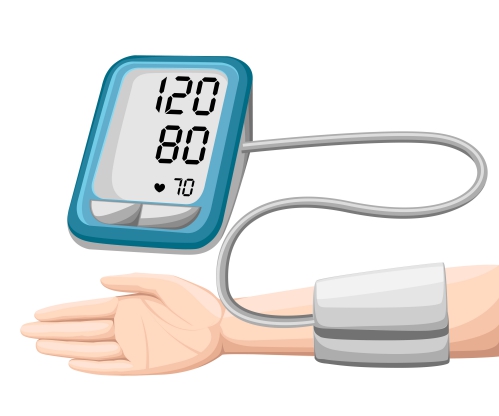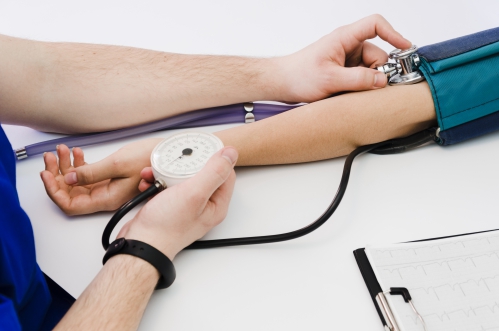What is High blood pressure?
High blood pressure most known as hypertension is a problem where the pressure of blood inside blood vessels increases to harmful levels.
Blood pressure is the pressure exerted by the blood on the artery walls while the heart is pumping and it takes into account the amount of blood flowing through the arteries along with the resistance which blood meets.
When it increases to unhealthy levels, many organs of the body such as kidney, eyes, heart and brain will be affected but will do so in a progressive manner and symptoms may or may not appear initially. Just as too much water flowing inside a hose can lead to damaging effects, in the same way the arteries will be damaged when blood pressure is elevated.
High blood pressure is a treatable condition and therefore early detection is essential. Usually, several readings of blood pressure measurement over a number of days is required to make the diagnosis as there are many factors which can cause the blood pressure to be elevated momentarily and lead to a wrong diagnosis such as rushing to the consultation room, fear and anxiety.
The treatment of high blood pressure comprises of both healthy lifestyle modification and medications. Untreated conditions may progress to disastrous health issues such as stroke and heart attack.
Causes of hypertension

There are 2 types of hypertension, namely primary and secondary hypertension.
Primary hypertension
Primary hypertension is also known as essential hypertension. It is the most common form of hypertension. Till date no identifiable cause has been found but there are some factors which can contribute to the illness (In 95% of high blood pressure in the U.S the underlying causes cannot be found). These factors are:
- Age
- Race: in the U.S the risk for hypertension for African Americans is twice as much as for Caucasians.
- Diet: high amount of salt in food will increase the risk for hypertension
- Obesity
- Stress: in a state of stress the body releases hormones (for example adrenaline and cortisol) which increases the blood pressure by causing the heart to beat faster and blood vessels to narrow.
- Lack of physical activity
- Genes: gene mutations or genetic abnormality inherited from parents
Secondary hypertension
The term secondary hypertension is usually used when a direct cause for hypertension can be identified. It can be more deleterious than primary hypertension and often occurs quickly. Causes of secondary hypertension are:
- Kidney disease
- Obstructive sleep apnoea
- Thyroid diseases
- Chronic alcohol use
- Substance abuse
- Congenital heart defects
- Side effects of drugs
- Adrenal gland diseases: small gland that sits on top on the kidneys
- Birth control pills: especially those containing oestrogen
- Smoking
- Pregnant women
- Salty food

Signs and symptoms of hypertension
Most of the time people will not have any symptoms unless the blood pressure is extremely elevated. It takes several years to develop a disease severe enough to cause obvious symptoms. Severe hypertension symptoms include the following:
- Headache
- Nose bleeds
- Dizziness
- Flushing
- Shortness of breath
- Chest pain
- Blood in urine
- Visual changes
- Nausea and vomiting
- Severe anxiety
- Seizures
- Confusion
- Irregular heartbeat
- Fatigue
These symptoms will not appear in everyone but when they do, prompt medical attention is required as it can be fatal. That is why blood pressure measurements are routinely taken at the doctor’s office to detect hypertension earliest possible. People having a family history of high blood pressure, heart diseases or any other factors that might lead to hypertension are advised to check their blood pressure at least twice per year.
Diagnosis of high blood pressure
The most useful tool to diagnose high blood pressure is by taking a blood pressure reading. At the doctor’s office blood pressure is routinely taken however if ever the blood pressure is elevated, additional measurements will have to be taken over the course of several days. That is because several environmental factors can increase blood pressure, such as stress caused by being in the doctor’s office (white coat effect) or having rushed to the office (this is why it is recommended that a patient waits comfortably for at least 5 minutes before having his/her blood pressure measurement taken). In addition, blood pressure changes throughout the day and do not stay constant.

To rule out any other conditions, more tests will be prescribed by the physician. These tests include:
- Urinalysis
- Electrocardiogram (ECG or EKG)
- Cholesterol test
- Echography of the heart and kidney
These tests will help the doctor to either identify the causes for the hypertension or to evaluate the toll of hypertension on the organs. In the meantime, treatment will be started by the doctor and lifestyle modifications advised.
Understanding blood pressure reading
The reading consists of 2 numbers; the number at the top is the systolic pressure and the one at the bottom is the diastolic pressure.
Systolic pressure: the pressure of blood in the arteries during contraction of the heart muscles
Diastolic pressure: the pressure of blood when the heart muscle is between beats
There are 5 blood pressure reading categories for adults (the blood pressure ranges for children and adolescents will be different):
Healthy
A systolic pressure of less than 120 millimetres of mercury (mmHg) and a diastolic pressure of less than 80 mmHg (<120/80 mmHg).
Elevated
A systolic pressure between 120-129 mmHg and the diastolic pressure is less than 80 mmHg (120-129/<80 mmHg).

Stage 1 hypertension
A systolic pressure between 130-139 mmHg or a diastolic pressure between 80-89 mmHg
Stage 2 hypertension
A systolic pressure of 140 mmHg or higher or a diastolic pressure of 90 mmHg or higher
Hypertensive crisis
A systolic pressure greater than 180 mmHg or a diastolic pressure greater than 120 mmHg. If the patient fits in this category, urgent medical attention is required. In addition, if any symptoms such as chest pain, shortness of breath or headache is present, the patient should be sent immediately to the emergency room.
Treatment strategies for high blood pressure
Primary hypertension
Initially, lifestyle modification is advised as it may help to reduce the hypertension. However, if lifestyle modification is not sufficient, medication will be prescribed by the doctor.
Secondary hypertension
Treatment of secondary hypertension is usually centred towards the underlying condition causing the hypertension. If it is a kidney or thyroid disease that is causing the blood pressure to be elevated, the doctor will treat those conditions first. Similarly, if the blood pressure is elevated because of side effect of a drug, the doctor will change the drug. Finding the optimum treatment is a progressive task as the medication which was working at first might not have the same efficacy in the long run.

Medications for high blood pressure
Beta-blocker
Beta-blockers work mainly by slowing the heart and reducing its force of contraction. These will reduce the amount of blood going out of the heart with each beat. In addition, the action of hormones such as adrenaline is blocked. This group of drug includes:
- Metoprolol (Lopressor, Toprol XL)
- Atenolol (Tenormin)
- Bisoprolol (Zebeta)
Diuretics
Diuretics also known as “water pills” lower the blood pressure by flushing salt (sodium) out of the body through the kidney, taking unwanted excess fluid with it. This excess fluid accumulates in the body as a result of high salt content in blood vessels which leads to high blood pressure. This group of drug includes:
- Spironolactone (Aldactone)
- Hydrochlorothiazide (Esidrix)
- Furosemide (Lasix)
ACE inhibitors (Angiotensin Converting Enzyme inhibitor)
ACE inhibitors prevent an enzyme in the body from producing Angiotensin-2 (a substance that narrows blood vessels) which will consequently help to relax the veins and arteries in the body to lower the blood pressure. This group of drug includes:
- Benazepril (Lotensil)
- Enalapril (Vasotec)
- Lisinopril (Prinivil, Zestril)
Angiotensin receptor blockers (ARBs)

ARBs help in lowering blood pressure by blocking receptors that Angiotensin acts on and will therefore prevent its constrictive effects on blood vessels. This group of drug includes:
- Candesartan (Atacand)
- Azilsartan (Edarbi)
- Losartan (Cozaar)
Calcium channel blockers
Calcium channel blockers lower the blood pressure by preventing calcium from entering cells of the heart and arteries thereby causing the heart to contract with less force and arteries to relax. This group of drug includes:
- Amlodipine (Norvasc)
- Verapamil (Calan, Verelan)
- Diltiazem (Cardizem, Tiazac)
Alpha-2 agonists
Alpha-2 agonists causes blood vessels to relax by modifying the nerve impulses that initially causes the narrowing of those vessels. This group of drug includes:
- Clonidine (Catapres)
- Methyldopa (Aldomet)
- Tizanidine (Zanaflex)
Complications of hypertension
Complications affecting the heart
- Enlargement of the heart.
- Heart muscles become stiff and therefore reduces the heart’s ability to adequately fill with blood.
- Congestive heart failure: this when fluids build up around the heart preventing it to pump efficiently.
- Coronary artery disease.
- Cardiac arrhythmia: this is when the heart beats too fast, too slow or irregularly.

Complications affecting the brain
- Stroke: this when there is significant disruption of blood flow to the brain causing brain cells to die.
- Transient Ischaemic Attack (TIA): similar to stroke but is of short duration
Complication affecting the eyes
- Hypertensive retinopathy: this is when the blood vessels in the retina (area at the back of the eye where images focus) are damaged due to hypertension.
Complication affecting the kidneys
- Chronic kidney disease (CKD): CKD is also known as chronic kidney failure which is the gradual loss of kidney function.

Prevention of hypertension
There are many actions that a person can take to control or prevent the onset of hypertension. Some of them are listed below:
- Maintaining a healthy diet by reducing the salt content and by consuming more fruits and vegetables
- Avoid alcohol use
- Regular physical exercises
- Maintaining a healthy weight (body mass index of 18.5-24.9 kg/m²)
- Stress management
- Smoking cessation
Source:
Parveen, K. and Michael, C., 2017. Kumar & Clarks Clinical Medicine. 9th ed. The Netherlands: ELSEVIER.
Basile, J., n.d. Overview Of Hypertension In Adults.
Mann, J., n.d. Choice of drug therapy in primary (essential) hypertension.
J. Alastair, I. and Simon, M., 2016. Davidson's Essentials of Medicine. 2nd ed. London: ELSEVIER



